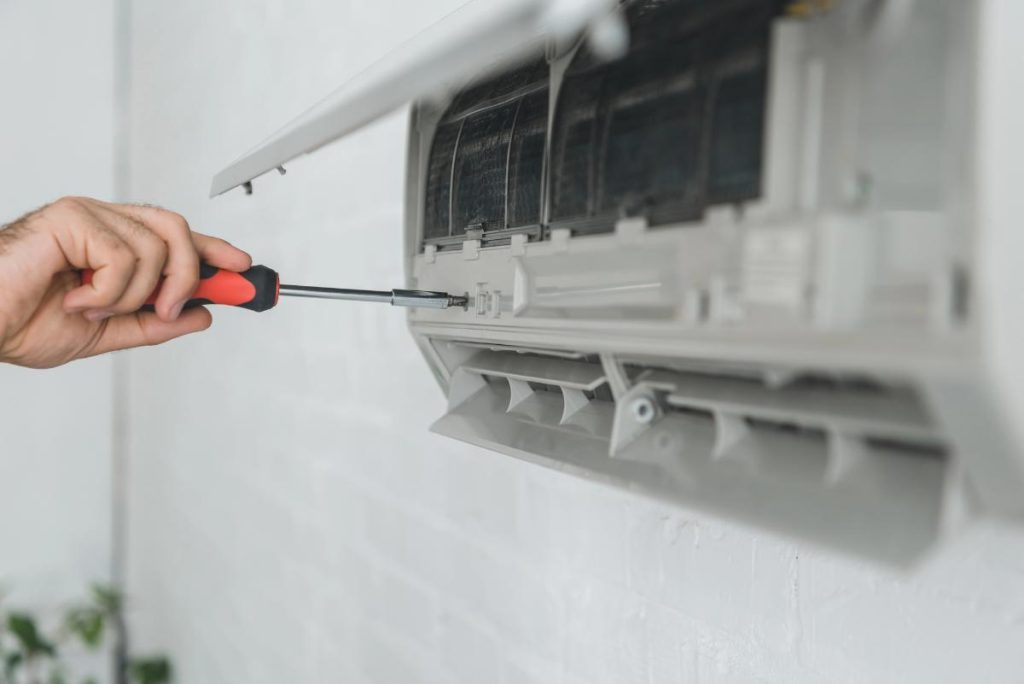Air conditioning is a vital part of comfort during hot weather. However, when your air conditioner (AC) starts to malfunction, it can cause significant discomfort and inconvenience. Recognizing the early signs of a problem can save you time, money, and stress, helping you avoid costly repairs or even a full system replacement. In this article, we’ll go over the common signs that your AC needs repairs and provide you with steps to address these issues promptly.

Common Signs Your Air Conditioner Needs Repairs
If your air conditioner is blowing weak or warm air instead of cold air, there’s an issue that needs to be addressed. Several factors could contribute to this problem:
- Clogged Air Filters: Over time, filters accumulate dust, dirt, and debris, which can block airflow. When the air can’t circulate properly, the system struggles to cool the air efficiently.
- Refrigerant Leaks: If your AC is low on refrigerant, it can’t cool the air effectively. A refrigerant leak is a common issue that requires a professional to locate and fix the leak and recharge the system.
- Faulty Compressor: The compressor is responsible for pressurizing the refrigerant and circulating it through the system. If the compressor is malfunctioning, the cooling process is compromised, and you’ll experience reduced cooling power.
AC Blowing Hot Air
If your air conditioner is blowing hot air instead of cold, it could be due to several reasons:
- Thermostat Issues: A malfunctioning or improperly set thermostat could cause the system to fail to regulate temperature properly.
- Low Refrigerant Levels: When refrigerant levels drop, the AC struggles to absorb heat from your home and releases warm air instead of cool air.
- Compressor Problems: If the compressor fails or is malfunctioning, it cannot circulate the refrigerant, resulting in hot air blowing from the unit.
Strange Noises
Unusual noises from your AC are never a good sign. If your air conditioner starts making strange sounds, it could indicate several potential issues:
- Hissing: A hissing sound may suggest a refrigerant leak, which can severely impact your AC’s performance.
- Buzzing or Grinding: These noises could indicate electrical issues, a foreign object in the fan, or a malfunctioning motor.
- Clicking: If you hear repeated clicking sounds, it could mean a faulty thermostat or a malfunctioning relay switch.
Water Leaks Around the Unit
Air conditioners produce condensation as they cool the air. However, if you notice water pooling around your unit, it could indicate an issue with the drainage system:
- Clogged Condensate Drain: Over time, the condensate drain can become clogged with dirt, algae, or debris, preventing water from draining properly.
- Frozen Coils: If the evaporator coils freeze, the excess ice can cause water to leak when it thaws. Frozen coils are often the result of airflow problems or a refrigerant leak.
AC Cycling On and Off Frequently
If your air conditioner is constantly turning on and off, this could indicate short cycling, a problem that can cause wear and tear on the system. Potential causes include:
- Faulty Thermostat: If the thermostat is malfunctioning, it may not regulate the temperature correctly, causing the AC to turn on and off too frequently.
- Low Refrigerant: Low refrigerant levels can cause the system to overheat, leading to short cycling.
- Electrical Problems: Wiring issues or a malfunctioning capacitor can also cause the AC to cycle erratically.
What to Do When Your Air Conditioner Shows Signs of Trouble
Preventative maintenance is the key to ensuring your air conditioner runs smoothly year-round. It’s recommended to have your AC serviced at least once a year, or twice if you live in a particularly hot climate. A professional technician can clean the coils, replace air filters, check the refrigerant levels, and inspect the overall condition of the system. Regular maintenance can help catch small issues before they become major problems, improving your unit’s lifespan and efficiency.
DIY Troubleshooting Tips
There are a few things you can check yourself before calling a professional:
- Thermostat Settings: Ensure your thermostat is set to the correct temperature and functioning properly.
- Change or Clean the Air Filter: If the filter is clogged, replace it or clean it according to the manufacturer’s recommendations.
- Check Vents and Ducts: Make sure that all vents are open and not blocked by furniture, curtains, or debris.
- Examine the Outdoor Unit: Look for visible debris or obstructions around the outdoor unit. Clear away leaves, dirt, or anything that could affect airflow.
When to Call a Professional
While DIY troubleshooting can help with minor issues, some problems require the expertise of a trained professional. Call an HVAC technician if:
- You suspect a refrigerant leak or need a refrigerant recharge.
- You hear strange noises that you cannot identify.
- The unit is experiencing electrical issues or a compressor malfunction.
- The system is not cooling your home properly despite your best efforts to troubleshoot.
Trane Air Conditioner Repair: What You Need to Know
If you have a Trane air conditioning unit, you might encounter some specific issues that require professional attention. Trane AC units are known for their reliability, but like any mechanical system, they can experience problems over time.
If you notice any of the warning signs, it’s crucial to act quickly and schedule Trane repair to prevent further damage and restore your unit’s performance. Professional technicians who specialize in Trane air conditioners can accurately diagnose problems and perform repairs that ensure your system runs efficiently for years to come.
Your air conditioner plays a crucial role in maintaining comfort during hot weather. By staying alert to the signs of potential issues—like weak air, strange noises, or unpleasant smells—you can address problems before they escalate. Regular maintenance with tune-ups and timely repairs are essential to keeping your AC running efficiently and extending its lifespan.
